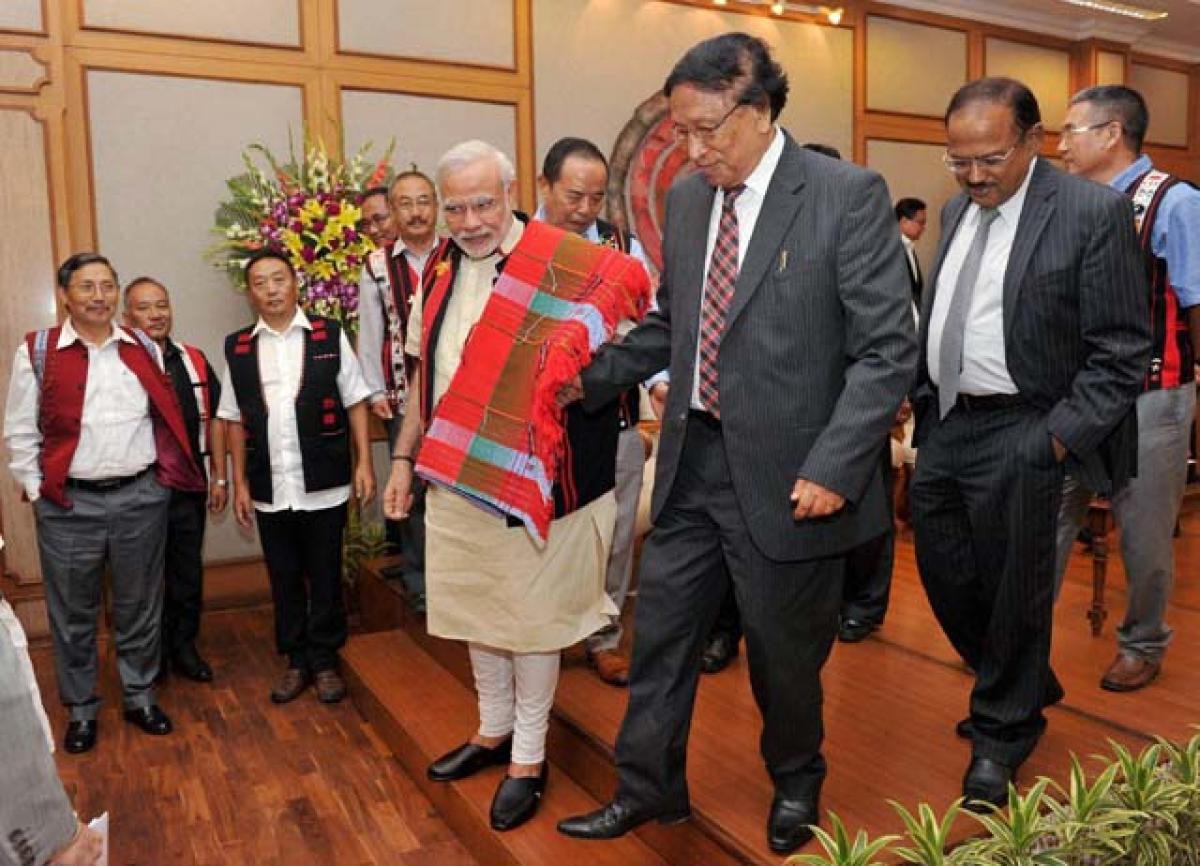Live
- Educational Trips in South Kanara Put on Hold Following Murudeshwar Drowning Incident
- Karnataka Temple Embraces Mechanical Elephant for Cruelty-Free Ceremonies
- Temple modelled after Ram Mandir to be constructed in US
- Property dealer shot dead in broad daylight in Ranchi
- Maharashtra: CM Fadnavis expands Cabinet; inducts 39 ministers
- Winter Session of UP Assembly from Dec 16; CM seeks cooperation of all parties
- AIADMK executive council meet passes sixteen resolutions, vows to make Edappadi CM again
- Manchu Family Feud Resurfaces in Jalpally
- Kerala Hindu leader gifts Rig Veda to Pope Francis
- 35 miners trapped under rubble in Afghanistan
Just In

Pact may ring in peaceful days. National Security Advisor Ajit Doval, aided by RN Ravi, Centre’s interlocutor for talks with NSCN (IM) and former Joint Director in-charge of the North East in Intelligence Bureau, played a pivotal role in the signing of this accord.
The troubled lands of the North East seem to have enthralled Indian prime ministers. Prime Minister Narendra Modi’s special interest in the National Socialist Council of Nagaland (NSCN), Issac-Muivah faction named after Isak Swu and T Muivah, which culminated in the Centre-NSCN (IM) accord on August 3 must be giving a déjà vu feel to Northeast-watchers as Rajiv Gandhi too had kept North East very high on his priority list and signed a historic accord with rebels from another northeastern state – Mizoram.
.jpg)
Interestingly, both Modi and Rajiv signed historic northeast-specific accords in the second year of their prime ministership. This is Modi’s moment in the sun as Rajiv Gandhi had his in 1986 when he had signed the Mizo peace accord with the then Mizo rebel leader Laldenga who soon thereafter went on to become the chief minister of Mizoram.
The Centre-NSCN(IM) accord, which had been eluding for over six decades and now puts an end to India’s longest running insurgency, is PM Modi’s first major foray into the cobweb of militancy in the North East. It has been made possible as a result of sustained work done PM Modi himself taking personal interest.
National Security Advisor Ajit Doval, aided by RN Ravi, Centre’s interlocutor for talks with NSCN (IM) and former Joint Director in-charge of the North East in Intelligence Bureau, played a pivotal role in the signing of this accord. The Prime Minister gave an indication of his special interest over the issue in his remarks after witnessing the signing of the accord at his official residence 7, Race Course Road.
He said: "Since becoming prime minister last year, peace, security and economic transformation of North East has been amongst my highest priorities. It is also at the heart of my foreign policy, especially the ‘Act East’ Policy. I have been deeply concerned about resolving the Naga issue.
Soon after entering office, I appointed an interlocutor for talks with the Naga leaders, who not only understood the Naga people as also their aspirations and expectations, but has great affection and respect for them. Given the importance of this initiative, I asked my office to supervise these talks and I personally kept in touch with the progress."
The historic Centre-NSCN (IM) accord will have many strategic fallouts. One, the development will have a huge impact on the law and order situation in many northeastern states, not just Nagaland, where NSCN(IM) wield lot of influence. It means that insurgency in many parts of northeast will now come down substantially.
Two, it will isolate the Khaplang faction of the NSCN, known as NSCN(K), and will put more pressure on NSCN(K) to come around and accept India as their country and bring peace to the state. Three, it will be an effective counter to the north-eastern militant outfits’ move of trying to put up a united front and emerge as a bigger body.
Just about three months ago, a new umbrella group called United National Liberation Front of Western South East Asia (UNLFW) was formed with Khaplang as its head. Monday’s development will send a signal to China as well. Accord with NSCN(IM) will lead to real time intelligence which will keep China wary. (The writer is consulting editor of www.firstpost.com and a strategic analyst)
By Rajeev Sharma

© 2024 Hyderabad Media House Limited/The Hans India. All rights reserved. Powered by hocalwire.com







